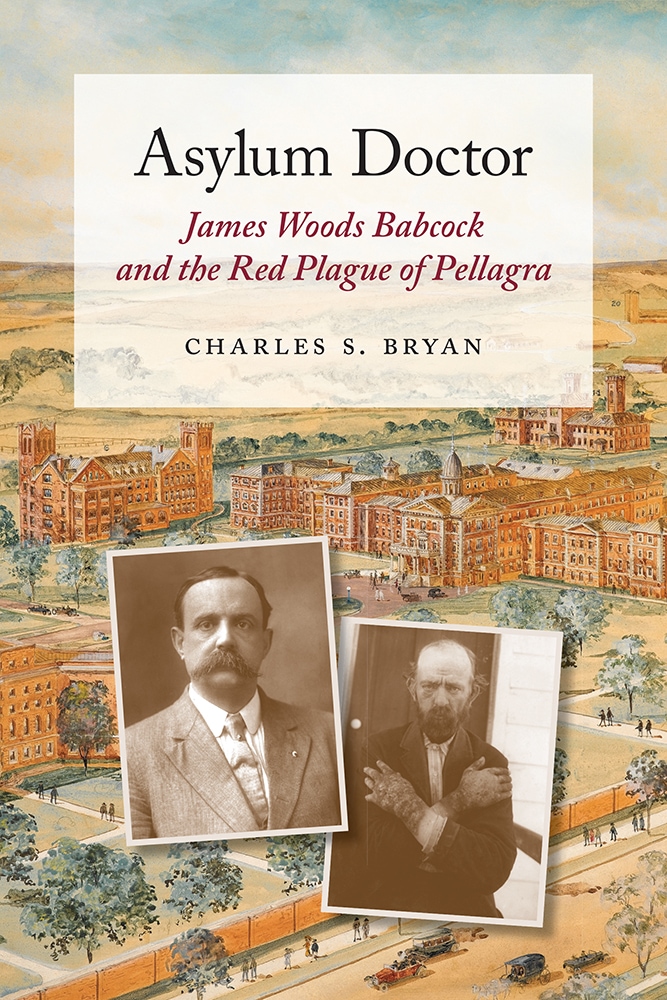Black History Month Sale: 40% off all books, plus FREE SHIPPING on all U.S. orders over $50 | Use code JBHM26

Size: 6 x 9
Pages: 432
Illustrations: 86 halftones
Charles S. Bryan
The inclusion of this book in the Open Carolina collection is made possible by the generous funding of
"Bryan engagingly relates Babcock's successes and failures under strict Jim Crow mandates, producing an enjoyable read that rounds out the multiple works already dealing with pellagra."—South Carolina Historical Magazine
"Charles Bryan, physician and accomplished historian of medicine, has written an informative and stimulating book. Weaving together biography and a detective story with an unusual perspective on the Tillman-Blease era of South Carolina history, Asylum Doctor merits the attention of everyone interested in the development of modern medicine as well as in the history of the Palmetto State."—William J. Cooper, Jr., Louisiana State University, author of Jefferson Davis: American and We Have the War Upon Us: The Onset of the Civil War, November 1860–April 1861
"The extensively researched and documented book is extremely well written and will be of great value for many readers."—Choice
"Bryan's story of James Babcock, the state mental institution, and the battle against pellagra is not only an outline of an important era in South Carolina history, but also a testament to the medical knowledge, scholarship and commitment of the author."—Charlie Nutt, The Free Times
"Years before the U.S. Public Health Service assigned Joseph Goldberger to discover the cause and cure of pellagra in 1914, James Woods Babcock, superintendent of the South Carolina State Hospital for the Insane was a pioneer in pellagra studies. In this compelling biography, Charles Bryan offers the previously untold story of how Babcock initially sounded the alarm about pellagra in the United States and used his considerable organizational skills to gather those needing to know more about the dread disease that some called the scourge of the South."—Alan M. Kraut, University professor of History, American University, author of Goldberger's War, the Life and Work of a Public Health Crusader
"Asylum Doctor is a three-course feast—a biography, an asylum history set in the Deep South, and a story of the American encounter with pellagra—served by an author who blends high degrees of medical expertise and historical skill. A gourmet offering in the history of medicine."—Michael Bliss, University of Toronto, author of The Discovery of Insulin and William Osler: A Life in Medicine
"An extremely well-done biography of an important but neglected figure in the history of the care of the mentally ill in the United States . . ."—Gerald Grob, Rutgers University, author of Mental Health and American Society, 1875-1940 and The Mad Among Us: A History of the Care of America's Mentally Ill
"A thoroughly researched and engagingly written study and a significant contribution to our understanding of the history of mental health care in the South. The chapters dealing with Babcock's important role in the search to understand pellagra are especially notable. After reading them, I felt that I understood the epidemiological history of this terrible nutritional disease for the first time. They also provide an object lesson in how science is sometimes sidetracked by the force of personal, social, and cultural influences.——"—Peter McCandless, College of Charleston, author of Moonlight, Magnolias, and Madness: Insanity in South Carolina from the Colonial Period to the Progressive Era and Slavery, Disease, and Suffering in the Southern Lowcountry
"A beautifully written, erudite, deeply human story of a flawed hero. Bryan presents Babcock as modest, talented, goodhearted, and dedicated to medicine but ill-equipped to deal with the politics of running an asylum, and overly reticent about his role in the evolving history of pellagra. The reader is quickly absorbed in fights about money, medical science, asylum management, and the fates of the various participants involved. A tour de force."—Rosemary A. Stevens, author of American Medicine and the Public Interest and In Sickness and in Wealth: American Hospitals in the Twentieth Century
Copyright 2026
Website By Morweb.org